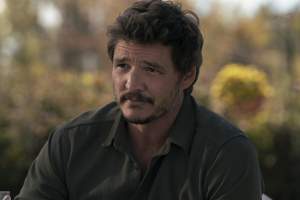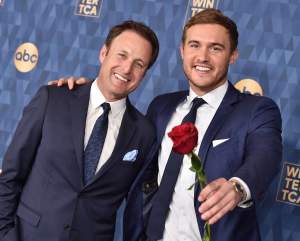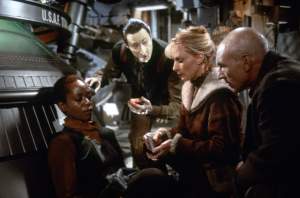Newhart (The Last Newhart)

bigpix/moviestillsdb
These days, Newhart is one of those shows that is probably more well known because of the piece of trivia around its finale than it is for being an amazingly funny sitcom that ran for eight seasons. However, it is that, too.
The final episode of Newhart blew the audience’s minds in its final moments. Bob Newhart’s character is knocked out by an errant golf ball. From there, the character is transported to the bedroom of his previous sitcom, The Bob Newhart Show. It was an incredible meta moment, going so far as to use the first series’ closing theme and credits. There hasn’t been anything like it before or since.
Parks and Recreation (One Last Ride)

patricklucas/moviestillsdb
The final season of Parks and Recreation was a bit of a mixed bag, with the three-year time jump introduced at the end of the previous season requiring a lot of backfill exposition that took up increasingly valuable episode time. Still, when it finally came time for the show to take its final bow, creator Michael Schur and his cast and crew unsurprisingly knocked it out of the park.
The finale jumps around between the present and the future, and the audience gets a peak at what the future holds for every character. Spoiler alert — everyone gets a happy ending. But what else would you expect from one of the most relentlessly positive, hopeful shows ever made?
The Good Place (Whenever You’re Ready)

mitchellgreen/moviestillsdb
Leave it to a show as brilliant as The Good Place to give viewers a finale that’s about the finality of things in a show about people who have already passed on to the afterlife.
After an incredible four-episode series, “Whenever You’re Ready” finds our cast existing in the new afterlife system they’ve devised and realizing that an infinite, perfect existence robs that very existence of its meaning. Expect plenty of tears as each character decides to move on, but also a meaningful, satisfying conclusion to a comedy that was always about grappling with these kinds of big ideas
Cheers (One For The Road)

jeffw616/moviestillsdb
Cheers had changed a lot over its incredible eleven-season run on NBC. Coach had left us and was replaced by Woody. Likewise, when Diane left the show they introduced Rebecca. Frasier went from a small recurring part of a beloved character who would get his spinoff. Even the tone of the show changed, getting broader and more tangibly sitcom-y in the end.
Yet despite all the changes, it was the perfect choice to revisit what sparked its popularity to begin with: the “will they won’t they” of Sam and Diane. The episode has a sense of finality to some things, but also that life will carry on.
It’s the last call. Have one for the road, and maybe we’ll see you again next week.
Succession (With Open Eyes)

reesdcyar/moviestillsdb
People who were frustrated by the finale of Succession were the viewers who misunderstood what the series was all about. Yes, the palace intrigue was compelling, and everyone had their theories on who would ultimately win the crown, but the human drama was the engine that drove the story.
Two scenes in the finale perfectly sum up the series and the relationship between the three Roy children that their father had engendered — that beautiful moment in Barbados, with the siblings finally united and seemingly happy, and then the meltdown outside the boardroom when their egos collapse in on one another. It’s thrilling, cringe-inducing, tragic, and not at all about who gets to be CEO.
Breaking Bad (Felina)

yaut/moviestillsdb
Breaking Bad’s brilliant use of music was, from the very beginning, part of the special formula that elevated it from pulpy cable drama into one of the great character studies in TV history. The song Faleena, for example, not only featured heavily in the finale but was also clearly a road map for the final arc of Walter White and was the inspiration for the title of the episode (“Felina”).
The final moments for Walter, alone and dying in a meth lab, are appropriately morally gray. He saved Jesse, yes, but like everyone else around Walter, he’s been completely shattered, and only Water gets to exit the stage on his terms.
Star Trek: The Next Generation (All Good Things…)

CozICan/moviestillsdb
Putting together the final episode of an episodic TV show is a tricky thing, especially for a series like Star Trek where there are few overarching stories or even long-term changes in character.
“All Good Things…” is the platonic ideal of this kind of finale. It cleverly uses a very Star Trek-y plot device to show us where the show started, where it is now, and give a glimpse of things yet to come — all to brilliantly create that sense of change and finality that comes so easily to a modern serialized drama.
The series’ final moment — where Captain Picard finally joins his senior officers in their friendly poker game — is one of the most moving in the entire franchise and a perfect sendoff to the TNG crew. Peak television.
Six Feet Under (Everyone’s Waiting)

asilzade58/moviestillsdb
Before it even got to the finale, the final season of Six Feet Under had one of the boldest, most jaw-dropping moments in TV history. No spoilers.
The episode starts with a twist — opening not with a death as every other episode had, but with a birth. The way it ends, though, should not have come as a surprise at all. In one of the most ugly-cry-inducing endings in TV history, set to the song “Breathe Me” by Sia, we learn how every single main character of the series meets their end. Some are tragically young, others bittersweet but not unexpected.
It’s an emotionally powerful sequence that will stick with you for a long, long time.
Mad Men (Person to Person)

jeffw616/moviestillsdb
The best part of the final moments of Mad Men is how it’s open to interpretation.
At a retreat in Big Sur, California Don Draper sits in meditation. The camera pushes in and we see that he may have finally found peace. We hear a bell ring… and ring… and a smile comes to his face. Then, the famous “Hilltop” Coca-Cola TV commercial plays. End of series.
Perhaps Don found contentment and he sincerely created the spot. Maybe a bell rang and he realized he could package and sell his recent experience to move cola. Maybe he didn’t have anything to do with the ad at all (in real life, it was made by ad man Bill Backer). Does it even matter?
A fitting ending to one of the greatest television series ever made.
The Sopranos (Made in America)

jeffw616/moviestillsdb
The Sopranos might have the most famous — and infamous — ending in TV history. It is also among the greatest. “Don’t Stop Believing” on the jukebox. Tony and his family looking at menus. At that moment, Tony seems content. Then a smash cut to black.
There’s been plenty of debate on the meaning of those final moments. But if you rewatch the series, particularly the last season, the clues are all there.
“You probably don’t even hear it when it happens,” speculates one of Tony’s closest associates. That very same character is killed while lost in a moment, and he likely didn’t hear it either.
Still, nothing is settled and it’s open to interpretation. If you want to think Tony has a happy ending, don’t stop believing.







